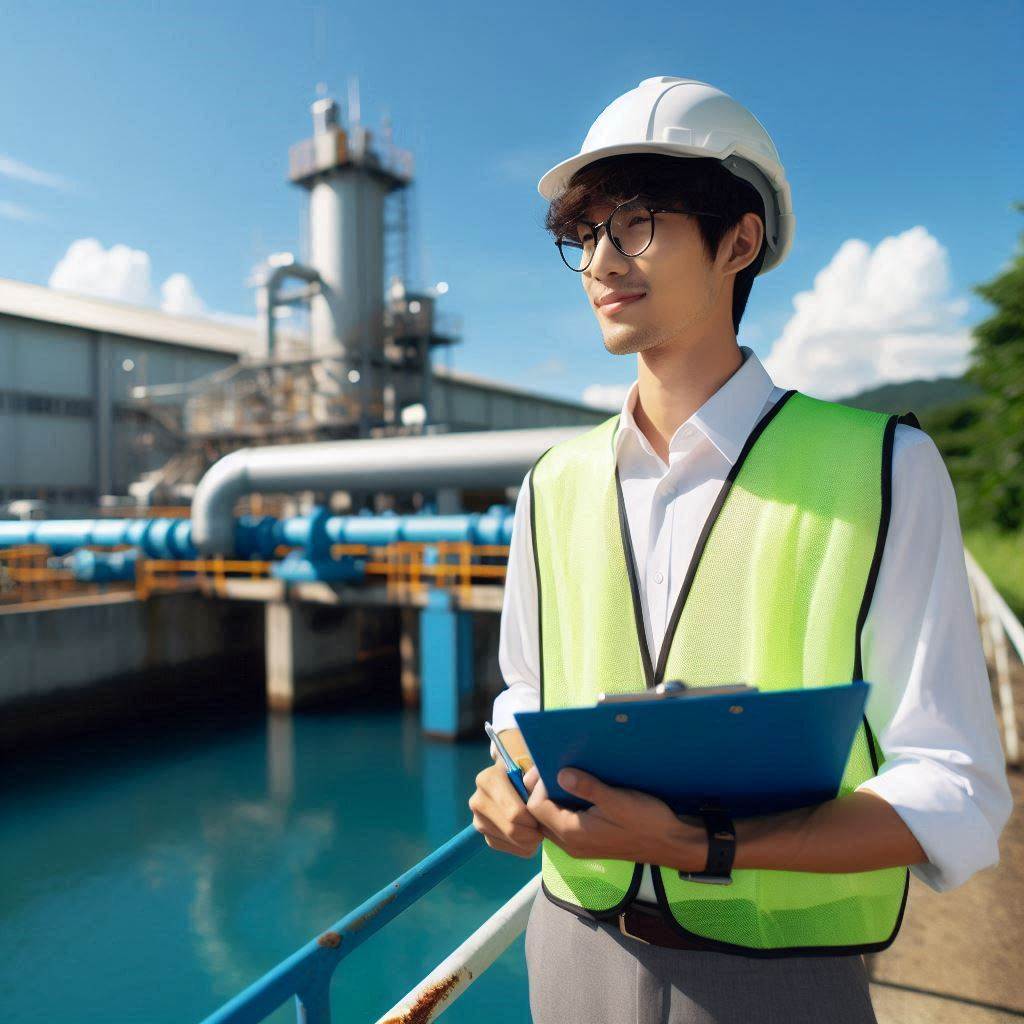Introduction
Environmental engineers play a crucial role in the oil and gas industry.
They focus on minimizing environmental impacts from exploration, production, and refining processes.
These engineers ensure compliance with environmental regulations and strive to promote sustainable practices.
The oil and gas industry, while vital for global energy needs, can significantly impact the environment.
Environmental engineers work to mitigate these impacts and enhance sustainability.
Their expertise helps in managing waste, controlling emissions, and protecting natural resources.
In their role, environmental engineers tackle challenges such as oil spills, air pollution, and water contamination.
They implement strategies to prevent environmental degradation and ensure that operations adhere to strict environmental standards.
Their work involves designing and managing systems for waste treatment, emission control, and environmental monitoring.
The importance of environmental engineers in this sector cannot be overstated.
They help companies navigate complex regulations and adopt best practices for reducing their ecological footprint.
Their efforts contribute to the industry‘s ability to operate responsibly and sustainably.
In this blog post, we will explore the key responsibilities of environmental engineers in the oil and gas sector.
We will examine how they address environmental challenges, their contributions to sustainability, and the impact of their work on industry practices.
By understanding their role, we gain insight into the ongoing efforts to balance energy production with environmental stewardship.
Role of Environmental Engineers in the Oil and Gas Industry
Responsibilities of Environmental Engineers in Oil and Gas Companies
Environmental engineers play a crucial role in the oil and gas industry.
Their primary responsibility is to ensure operations minimize environmental harm.
They handle various tasks, including site assessments, pollution control, and waste management.
Designing systems to treat pollutants and manage waste products is a key part of their job.
They also develop strategies to prevent spills and leaks, which can be catastrophic to the environment.
Ensuring that operational practices align with environmental safety standards is essential to their role.
Importance of Monitoring and Managing Environmental Impact
Monitoring and managing environmental impact is critical for maintaining ecological balance.
Environmental engineers regularly conduct assessments to measure the impact of oil and gas operations.
They use advanced technologies and methodologies to monitor air, water, and soil quality.
This monitoring helps detect potential issues before they become significant problems.
They analyze data to ensure that operations do not exceed permissible environmental limits.
By doing so, they help minimize the adverse effects of oil and gas activities on local ecosystems.
Their efforts contribute to sustainable development within the sector.
Compliance with Regulations and Industry Standards
Compliance with regulations and industry standards is a fundamental aspect of an environmental engineer’s role.
They ensure their company adheres to all environmental laws and regulations.
This involves staying updated with changes in legislation and industry standards.
They prepare reports and documentation required for regulatory compliance and often liaise with regulatory agencies.
Ensuring that all practices meet legal requirements helps avoid legal penalties and promotes a positive corporate image.
Environmental engineers’ work is crucial for maintaining operational integrity and fostering responsible industry practices.
In summary, environmental engineers in the oil and gas industry are vital in protecting the environment.
They monitor and manage environmental impacts, ensure compliance with regulations, and implement best practices.
Their work is essential for reducing the environmental footprint of oil and gas operations and promoting sustainable practices within the industry.
Environmental Challenges Faced by the Oil and Gas Industry
Environmental engineers in the oil and gas industry often deal with a variety of challenges related to the impact of operations on air, water, and soil quality, as well as potential risks to ecosystems and human health.
These challenges require the development of mitigation strategies and the implementation of sustainable practices to minimize negative impacts and ensure responsible resource extraction.
Impact of Oil and Gas Operations on Air, Water, and Soil Quality
- Air Quality: Emissions from oil and gas operations, including methane, volatile organic compounds, and other pollutants, contribute to air pollution and can have harmful effects on human health and the environment.
- Water Quality: Contamination of water sources can occur through spills, leaks, and runoff from drilling sites, which can lead to pollution of rivers, lakes, and groundwater, affecting aquatic ecosystems and drinking water supplies.
- Soil Quality: Soil contamination from oil and gas activities can occur through spills, leaks, and improper disposal of waste materials, leading to degradation of soil health and fertility.
Potential Risks to Ecosystems and Human Health
- Ecosystems: Oil and gas operations can disrupt natural habitats, endangering wildlife, plants, and ecosystems through habitat destruction, fragmentation, and pollution, which can have long-term impacts on biodiversity and ecosystem services.
- Human Health: Exposure to pollutants from oil and gas activities can pose risks to human health, including respiratory problems, cardiovascular diseases, and other health issues, particularly for communities living near extraction sites or downstream from industrial facilities.
Need for Mitigation Strategies and Sustainable Practices
- Mitigation Strategies: Environmental engineers work to develop and implement mitigation strategies to reduce the environmental impact of oil and gas operations, including technologies to capture and reduce emissions, containment measures to prevent spills, and monitoring programs to track environmental conditions.
- Sustainable Practices: Implementing sustainable practices in the oil and gas industry involves promoting energy efficiency, recycling and reuse of materials, reducing waste generation, restoring disturbed landscapes, and adopting best management practices to minimize environmental footprint and promote long-term sustainability.
Essentially, environmental engineers play a crucial role in addressing the environmental challenges faced by the oil and gas industry.
By working to mitigate the impact of operations on air, water, and soil quality, reduce risks to ecosystems and human health.
And promote sustainable practices, they help ensure that energy production can be carried out responsibly and in harmony with the environment.
Read: 5 Essential Software Tools Every US Architect Uses.
Key Skills and Qualifications of Environmental Engineers
Educational Background and Training Required for the Role
Environmental engineers need a solid educational foundation.
A bachelor’s degree in environmental engineering, civil engineering, or a related field is essential.
Many professionals also pursue a master’s degree to gain specialized knowledge and enhance their qualifications.
Advanced degrees often lead to better job prospects and higher positions within the industry.
Training and certification are crucial for environmental engineers.
They frequently obtain certifications from recognized bodies such as the American Board of Industrial Hygiene (ABIH) or the Board of Environmental Science and Technology (BEST).
These certifications validate their expertise and commitment to the field.
On-the-job training provides practical experience, essential for understanding complex environmental challenges.
Knowledge of Environmental Laws and Regulations
A deep understanding of environmental laws and regulations is vital.
Environmental engineers must be familiar with local, state, and federal regulations.
They need to know the Clean Air Act, Clean Water Act, and Resource Conservation and Recovery Act.
Compliance with these regulations ensures that oil and gas operations meet legal and environmental standards.
Engineers also need to stay updated on evolving regulations and industry standards.
Regularly reviewing changes in laws and regulations is crucial for maintaining compliance.
This knowledge helps engineers implement effective environmental management strategies and avoid potential legal issues.
Ability to Conduct Environmental Assessments and Implement Solutions
Conducting environmental assessments is a core responsibility.
Environmental engineers use various methods to assess the impact of oil and gas operations on the environment.
They collect data on air and water quality, soil contamination, and other factors.
These assessments help identify potential risks and areas needing improvement.
Implementing solutions based on assessments is equally important.
Engineers develop and recommend strategies to mitigate environmental impacts.
They design systems for waste treatment, pollution control, and resource conservation.
Effective implementation ensures that operations minimize harm to the environment.
Strong analytical and problem-solving skills are crucial for environmental engineers.
They must analyze complex data and develop practical solutions.
Communication skills are also important for explaining technical information to non-engineers and stakeholders.
Engineers often work in teams, so collaboration skills are necessary for success.
Technical skills are essential for using environmental monitoring equipment and software.
Engineers need proficiency in tools for data collection and analysis.
Familiarity with Geographic Information Systems (GIS) and environmental modeling software is often required.
These tools help in making informed decisions and developing effective solutions.
In summary, environmental engineers in the oil and gas industry need a combination of education, certification, and practical skills.
They must understand environmental laws, conduct thorough assessments, and implement effective solutions.
Their expertise helps ensure that oil and gas operations are both efficient and environmentally responsible.
Read: Decoding the Ethics & Responsibilities of US Civil Engineers
Technologies and Tools Used by Environmental Engineers
Monitoring Equipment for Assessing Air and Water Quality
Environmental engineers use various monitoring equipment to assess air and water quality in the oil and gas industry.
Real-time sensors and analyzers measure pollutants and concentrations in the air and water.
This equipment helps detect sources of contamination and track changes over time.
Air quality monitors measure particulate matter, gases, and other pollutants.
Water quality tools assess parameters like pH, turbidity, and chemical contaminants.
Regular data collection with this equipment allows engineers to address issues promptly and prevent environmental damage.
Geographic Information Systems (GIS) for Mapping Environmental Data
Geographic Information Systems (GIS) are essential for mapping and analyzing environmental data.
GIS technology enables engineers to visualize spatial information and integrate various data layers.
By mapping pollutant distribution and affected areas, GIS supports decision-making and helps prioritize remediation efforts.
It assists in planning and managing environmental protection strategies, including identifying potential spill zones and assessing the impact of projects.
Accurate spatial analysis with GIS is crucial for compliance with environmental regulations and minimizing risks to surrounding communities.
Software for Modeling and Predicting Environmental Impacts
Software for modeling and predicting environmental impacts plays a vital role in environmental engineering.
Engineers use advanced modeling software to simulate scenarios and assess the outcomes of different actions.
These models predict how pollutants disperse in the environment and their long-term effects on ecosystems.
Environmental impact modeling software supports risk assessment and helps design effective mitigation strategies.
It enables engineers to evaluate control measures and optimize pollution control systems.
Predictive models guide proactive solutions and help minimize environmental harm.
Together, these technologies and tools empower environmental engineers to manage the oil and gas industry’s environmental footprint effectively.
They provide critical data and insights for maintaining air and water quality, assessing spatial impacts, and predicting future environmental conditions.
Using these tools, engineers ensure that oil and gas operations align with sustainability goals and regulatory requirements.
Read: Top Cities for Electrical Engineering Jobs in America

Collaboration with Other Professionals in the Industry
Working with engineers, geologists, and regulators to address environmental issues
Environmental engineers in the oil and gas industry play a crucial role in collaborating with other professionals to address environmental concerns and promote sustainable practices.
By working hand in hand with engineers, geologists, and regulators, they can develop effective strategies to mitigate the impact of oil and gas operations on the environment.
Communicating findings and recommendations to stakeholders
One of the key aspects of collaboration is effective communication.
Environmental engineers must communicate their findings and recommendations to stakeholders, including government agencies, community members, and industry partners.
By effectively conveying the importance of environmental protection and the benefits of implementing sustainable solutions, they can garner support for their initiatives.
Implementing solutions through cross-functional teamwork
Implementing solutions to environmental challenges often requires cross-functional teamwork.
Environmental engineers work closely with other professionals, such as chemical engineers, environmental scientists, and risk assessment specialists, to develop comprehensive strategies that consider various aspects of oil and gas operations.
By leveraging the expertise of different disciplines, they can create innovative solutions that address complex environmental issues effectively.
Collaboration with engineers in the oil and gas industry is essential for integrating environmental considerations into the design and operation of facilities.
By working together, environmental engineers and process engineers can identify opportunities to reduce emissions, minimize waste generation, and optimize resource use.
This collaborative approach can help oil and gas companies improve their environmental performance and meet regulatory requirements.
Geologists also play a crucial role in collaboration with environmental engineers.
They provide valuable insights into the geological characteristics of a site, which can influence the selection of appropriate remediation techniques and monitoring strategies.
By working together, geologists and environmental engineers can develop site-specific solutions that address the unique environmental challenges posed by oil and gas operations.
Collaborating for Compliance and Innovation: The Role of Environmental Engineers with Regulators and Industry Professionals
Regulators are another key group of professionals that environmental engineers collaborate with in the oil and gas industry.
Regulatory agencies set environmental standards and guidelines that companies must comply with to ensure the protection of air, water, and land resources.
By working closely with regulators, environmental engineers can ensure that their projects meet regulatory requirements and maintain environmental sustainability.
Overall, collaboration with other professionals in the oil and gas industry is essential for environmental engineers to effectively address environmental issues and promote sustainable practices.
By working together with engineers, geologists, and regulators, environmental engineers can develop innovative solutions, communicate their findings.
And implement strategies that protect the environment and support the long-term viability of the oil and gas industry.
Read: US Tech Hubs Beyond Silicon Valley: Emerging Cities
Transform Your Career Today
Unlock a personalized career strategy that drives real results. Get tailored advice and a roadmap designed just for you.
Start NowCase Studies of Successful Environmental Engineering Projects
Examples of Environmental Engineers Making a Positive Impact in the Oil and Gas Industry
Environmental engineers have significantly improved the oil and gas industry‘s environmental performance.
One prominent example is the Carbon Clean Solutions project at a major U.S. refinery.
Engineers implemented advanced absorption technology to capture 90% of CO? emissions, setting a high standard for emission reduction.
Another example is Norway‘s offshore oil platforms, where engineers developed a new system for treating and recycling produced water.
This system achieved a 95% reduction in contaminants, demonstrating an effective waste management approach in a challenging environment.
Innovative Solutions for Reducing Emissions and Minimizing Waste
Several innovative solutions have been implemented to address emissions and waste in the industry.
In the U.K. BP‘s flaring reduction program at North Sea operations introduced advanced flare gas recovery systems.
This initiative resulted in a 60% reduction in flare emissions, showcasing effective technology for cleaner energy practices.
In the Middle East, a major oil producer adopted new gas-to-liquids (GTL) technology.
This technology converts natural gas into high-quality liquid fuels, reducing flaring and enhancing resource value.
These advancements not only decreased harmful emissions but also optimized the use of natural gas resources.
Lessons Learned from Past Projects and Their Implications for Future Initiatives
The successes of these projects offer valuable lessons for future initiatives.
Adopting cutting-edge technologies has proven crucial.
The CO? capture and GTL technologies exemplify how innovative solutions can lead to significant environmental benefits.
Collaboration among engineers, regulatory agencies, and industry stakeholders has also been vital.
Effective projects often involve thorough planning, ongoing monitoring, and adaptive management.
Engaging all relevant parties ensures practical and effective solutions.
Future projects should focus on continuous innovation and adaptability.
The experiences from these case studies underscore the importance of scaling successful technologies and approaches.
Ongoing research and development will be essential to addressing emerging environmental challenges and advancing sustainable practices in the oil and gas industry.
Overall, these case studies illustrate that environmental engineering can drive substantial positive change.
By embracing innovation and collaboration, the industry can move towards more sustainable practices and reduce its environmental impact.
See Related Content: Salary Expectations for Biomedical Equipment Technicians
Opportunities for Career Growth and Development
Advancement Prospects for Environmental Engineers in the Oil and Gas Sector
Environmental engineers in the oil and gas industry enjoy strong advancement prospects.
As they gain experience and demonstrate expertise, they can move into higher-level positions.
Roles such as Environmental Manager or Director of Environmental Affairs become accessible.
These senior positions come with increased responsibilities and significantly higher salaries.
Engineers can lead larger projects and make more impactful decisions regarding environmental management.
Continuing Education and Certification Options
Continuing education and certifications are crucial for career growth.
Engineers can enhance their qualifications by pursuing certifications like the Certified Environmental Professional (CEP).
Advanced degrees in environmental science or sustainability also open new doors.
Specialized courses in regulatory compliance, environmental impact assessment, or pollution control are particularly beneficial.
These credentials not only boost an engineer’s expertise but also improve their marketability and job prospects.
Potential for Leadership Roles and Specialization in Specific Areas of Environmental Engineering
Leadership roles offer significant career advancement opportunities.
Engineers who show strong project management skills and strategic thinking can progress to leadership positions.
These roles involve managing teams, overseeing projects, and influencing environmental policies.
Engineers can also specialize in niche areas such as environmental impact assessments, waste management systems, or pollution control technologies.
Specializing in a particular field can establish engineers as subject matter experts, leading to further career advancement.
In addition to traditional roles, engineers can explore research and development opportunities.
Working on innovative technologies or sustainable practices can position them at the forefront of industry advancements.
Research roles often involve collaboration with academic institutions or technology firms, leading to new solutions and innovations.
Networking through professional associations and industry conferences provides further growth opportunities.
Joining organizations like the Society of Environmental Engineers (SEE) or the American Society of Civil Engineers (ASCE) connects engineers with industry leaders and peers.
These connections can lead to job opportunities, mentorship, and collaborative projects.
By pursuing these growth avenues, environmental engineers in the oil and gas industry can build a rewarding and successful career.
They can advance through senior roles, gain specialized knowledge, and lead impactful projects.
Continuing education, certifications, and professional networking are key components in achieving long-term career success.
Conclusion
Environmental engineers play a crucial role in the oil and gas industry.
Their expertise ensures that operations meet environmental standards and mitigate impacts.
By addressing pollution, waste management, and resource conservation, they help safeguard ecosystems and public health.
Their work is pivotal in balancing industry demands with environmental protection.
The oil and gas sector faces significant environmental challenges.
These challenges require proactive solutions and innovations from environmental engineers.
Their involvement in monitoring, compliance, and remediation is vital for minimizing adverse effects on the environment.
They implement technologies that reduce emissions, enhance efficiency, and promote sustainable practices.
Promoting sustainability and environmental stewardship is essential.
Companies should integrate advanced environmental practices into their operations.
Investing in cleaner technologies and stricter environmental policies will benefit both the industry and the planet.
Environmental engineers can lead these efforts by developing and applying innovative solutions.
We must prioritize sustainability in all industrial activities.
The oil and gas industry must adopt practices that protect natural resources and reduce environmental footprints.
Environmental engineers are at the forefront of these efforts, driving positive change and ensuring long-term environmental health.
Their work sets the standard for responsible industry practices.
[E-Books for Sale]
The Big Book of 500 High-Paying Jobs in America: Unlock Your Earning Potential
$19.99 • 500 High-Paying Jobs • 330 pages
Explore 500 high-paying jobs in America and learn how to boost your career, earn more, and achieve success!
See All 500 High-Paying Jobs of this E-Book
1001 Professions Without a Degree: High-Paying American Jobs You Can Start Now
$19.99 • 1001 Professions Without a Degree • 174 pages
Discover 1001 high-paying jobs without a degree! Unlock career tips, skills, and success strategies for just $19.99!




